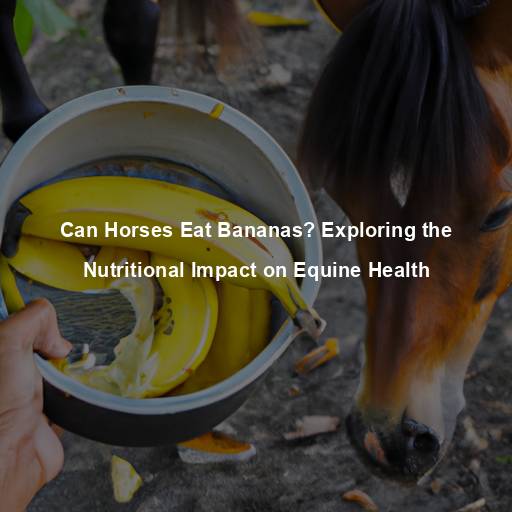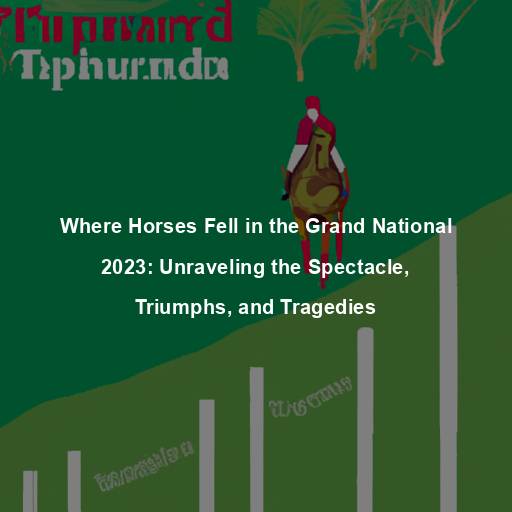Can Horses Eat Bananas? Exploring the Nutritional Impact on Equine Health
Last Updated on October 30, 2023 by Evan
Contents
- 1 Understanding the Equine Diet
- 2 The Equine Digestive System
- 3 The Impact of Bananas on Equine Health
- 4 Balanced Treats for Equine Enjoyment
- 5 Consulting with an Equine Nutritionist or Veterinarian
- 6 Considering Individual Sensitivities and Allergies
- 7 Consulting with Equine Professionals
- 8 FAQs – Can Horses Eat Bananas
- 8.1 Can horses eat bananas?
- 8.2 Are bananas nutritionally beneficial for horses?
- 8.3 How should bananas be prepared for horses?
- 8.4 Can horses eat banana peels?
- 8.5 Are there any risks associated with feeding bananas to horses?
- 8.6 How many bananas can a horse eat?
- 8.7 Can feeding bananas result in health issues for horses?
- 8.8 Are there any alternative fruits or treats for horses?
Understanding the Equine Diet
The awe-inspiring beauty and majestic presence of horses never fails to captivate our hearts. Their elegant strides, immense strength, and unwavering companionship make them truly remarkable creatures. As devoted caretakers, it is our solemn duty to ensure that our equine companions receive the utmost care, starting from their well-balanced and nourishing diet. While horses typically thrive on a diet primarily consisting of forage, such as luscious hay and lush green grass, it is only natural for horse owners to ponder the possibility of introducing occasional treats into their beloved steed’s eating regimen.
The Nutritional Composition of Bananas
Before we can assess whether horses can safely consume bananas, it is crucial to understand their nutritional composition. Bananas are a tropical fruit that is rich in various nutrients, including carbohydrates, dietary fiber, vitamins, and minerals. They are a great source of potassium, vitamin C, and vitamin B6. However, it’s important to note that the nutritional needs of horses differ significantly from those of humans.
The Equine Digestive System
Herbivores with Unique Digestive Adaptations
When it comes to their eating habits, horses are fascinating creatures. Their digestive system is quite different from our own, with a sizeable cecum and a sophisticated hindgut that help them break down plant-based materials with utmost efficiency. Thanks to this unique setup, horses are masters at fermenting fiber-rich foods, making them true experts at grazing on grass and munching on high-fiber forage. It’s amazing how nature has equipped these majestic animals with such optimized digestive capabilities.
Balancing the Equine Diet
When it comes to keeping our majestic equine friends happy and healthy, we can’t overlook the importance of a well-rounded diet tailored to their unique nutritional requirements. A key ingredient in this recipe for success is none other than good old-fashioned forage, whether it be in the form of wholesome hay or sprawling pasture. Not only does this fiber-packed goodness ensure smooth sailing for their gut, it also acts as a formidable shield against dreaded digestive issues like the infamous colic. Of course, as much as we all love spoiling our four-legged companions with treats and supplements, it’s crucial to exercise caution and delicacy to avoid sending their intricate digestive system into a whirlwind of confusion.
The Impact of Bananas on Equine Health
Feeding Bananas in Moderation
While bananas are generally safe for horses to consume in moderation, they should never be a significant component of their diet. Horses have evolved to thrive on a diet rich in forage, and their digestive system is optimized for processing fibrous materials. Feeding large quantities of bananas or any other non-forage items can disrupt the delicate microbial balance in their gut.
Understanding Sugar Content
One concern with feeding bananas to horses is their sugar content. Bananas are naturally sweet due to the presence of fructose, which is a form of sugar. Excessive sugar intake can lead to various health issues in horses, including weight gain, insulin resistance, and laminitis. Therefore, it is crucial to consider the overall sugar content of a horse’s diet when introducing treats like bananas.
Potential Choking Hazard
Another consideration when feeding bananas to horses is the risk of choking. Horses have a unique way of consuming food, using their teeth and tongue to break down and manipulate grass or hay. The texture and size of bananas can pose a choking hazard if not properly chewed by the horse. It is advisable to slice or mash bananas into smaller pieces before offering them to your equine companion.
Individual Sensitivities and Allergies
Just like humans, horses can have individual sensitivities or allergies to certain foods. While bananas are generally well-tolerated by horses, it is essential to observe your horse closely for any signs of adverse reactions. If you notice any digestive upset, behavioral changes, or allergic symptoms after feeding bananas, it is best to consult with a veterinarian.
Balanced Treats for Equine Enjoyment
Healthy Alternatives
As horse owners, we often find ourselves reaching for the trusty banana as a treat for our equine friends. However, it’s time to dive into a world of tantalizing alternatives that truly complement their dietary needs. Ranging from the crisp crunch of carrots to the juicy sweetness of apples, not forgetting the refreshing seedless watermelon, these choices offer a delightful symphony of flavors that resonate with their natural instincts. So, let’s bid farewell to the predictable and embrace a realm of treats that will leave our horses bursting with perplexing delight.
Moderation is Key
Regardless of the treat chosen, moderation is always key. Treats should never replace the essential components of a horse’s diet, such as forage or a balanced concentrate feed. The joy of providing treats to our equine companions lies in the occasional indulgence, rather than a regular occurrence.
Consulting with an Equine Nutritionist or Veterinarian
Seeking Professional Guidance
When in doubt about the suitability of any food item for your horse, it is always wise to consult with an equine nutritionist or veterinarian. These professionals possess the knowledge and expertise to evaluate your horse’s specific dietary requirements and advise on appropriate treats or supplements.
Individual Considerations
When it comes to our beloved horses, we must embrace the complexity of their dietary needs. Age, breed, health conditions, and activity level all contribute to the unique nutritional requirements of these majestic creatures. To ensure their well-being, it is vital to seek the guidance of a knowledgeable professional who can navigate the intricacies of equine nutrition and tailor a personalized plan to meet their individual needs.
Balancing Nutritional Needs
As responsible horse owners, it is crucial to understand the nutritional needs of our equine companions. Horses thrive on a diet that is rich in fiber, with the majority of their calories coming from forage such as hay or pasture. These fibrous materials promote proper gut function and help prevent digestive issues. While treats like bananas can be offered occasionally, it is important to ensure they do not disrupt the delicate balance of the equine digestive system.
The Role of Fiber
When it comes to the equine diet, fiber takes center stage with its myriad of benefits. From adding substance to the menu to facilitating digestion and preserving a harmonious gut flora, its value cannot be understated. Equipped with a distinctive digestive system tailored for fiber-rich sustenance, horses thrive on high-quality forage that fulfills their fiber needs. By prioritizing this essential element, the risk of issues such as colic and gastric ulcers can be effectively minimized, encouraging optimal equine health.
Understanding the Sugar Content of Bananas
One concern when it comes to feeding bananas to horses is their sugar content. Bananas are naturally sweet due to the presence of fructose, a form of sugar. Excessive sugar intake can lead to weight gain, insulin resistance, and laminitis in horses. Therefore, it is crucial to consider the overall sugar content of a horse’s diet when introducing treats like bananas.
Alternative Treats for Equine Enjoyment
When it comes to treating our equine friends, it’s important to steer away from the usual suspect – bananas – and explore other tantalizing options that truly suit their dietary needs. Take carrots, for instance. These root vegetables not only boast a low sugar content, but they also pack a punch with essential nutrients like beta-carotene. And let’s not forget about apples, a classic choice that can be a wholesome indulgence when enjoyed in moderation, minus the seeds.
The Importance of Moderation
When it comes to treating our beloved horses, it’s imperative to strike that delicate balance. While indulging in treats can be a delightful experience, it’s crucial to remember that they should never be a substitute for the fundamental pillars of a horse’s diet. The inclusion of forage and a well-balanced concentrate feed is a must. One cannot deny that overindulgence in treats, even something as seemingly innocuous as bananas, can have grave consequences on their nutritional equilibrium and well-being.
Considering Individual Sensitivities and Allergies
Variations in Tolerance
Just like us, horses can have their own unique dietary quirks. While bananas are typically a safe choice, it’s wise to keep an eye on your horse to ensure they don’t have any unexpected reactions. Some horses may have a more forgiving stomach, while others might be a bit more sensitive. Carefully watching how your horse reacts to new treats and seeking guidance from a vet if you notice any red flags is always a prudent move.
Potential Digestive Upset
Introducing new foods, including bananas, into a horse’s diet can potentially cause digestive upset. Horses have a sensitive gastrointestinal tract, and sudden dietary changes can disrupt the microbial balance in their gut. It is advisable to introduce new treats gradually and in small quantities, closely monitoring the horse’s response to ensure no adverse effects occur.
Allergic Reactions
In rare cases, horses may exhibit allergic reactions to specific foods, including bananas. Symptoms of an allergic reaction can vary but may include skin rashes, hives, itching, difficulty breathing, or swelling. If any of these symptoms occur after feeding bananas, it is important to seek veterinary attention promptly to address the situation and prevent further complications.
Consulting with Equine Professionals
Equine Nutritionists
When it comes to fueling our equine companions, the expertise of equine nutritionists shimmers like a beacon in the fog of uncertainty. With their extensive understanding of the intricate dance between horses and nutrition, these experts can decipher the unique dietary symphony each horse requires. If the idea of adding bananas or any other culinary concoction to your equine friend’s menu leaves you perplexed, fear not! Consulting an equine nutritionist will unravel the enigma and guide you towards the path of informed choices, guaranteeing your horse’s nutritional needs are bestowed with utmost care and consideration.
Veterinarians
When it comes to keeping our equine friends in tip-top shape, veterinarians are the unsung heroes, wielding their expert knowledge to ensure horses live their best lives. They are the guiding light when it comes to the delicate art of equine nutrition, armed with the know-how to determine if feeding your majestic steed a bunch of bananas is a wise move. Don’t be perplexed by the complex world of equine diet, seek the sage advice of a veterinarian to navigate the mind-boggling maze of horse nutrition.
FAQs – Can Horses Eat Bananas
Can horses eat bananas?
As equestrians, we often find ourselves pondering the curious question of whether our majestic equine companions can indulge in the sweet succulence of bananas. Delightfully, the answer is an affirmative one! Horses can indeed savor the peculiar taste and reap nutritional benefits from this exotic fruit. Yet, let us approach this newfound knowledge with a modicum of prudence, for while bananas offer a tantalizing reprieve from their usual fare, we must exercise constraint and restrict these delectable morsels to occasional indulgences, rather than transforming them into a staple of their daily sustenance.
Are bananas nutritionally beneficial for horses?
While bananas can be enjoyed by horses, they should be considered more of a treat rather than a significant source of nutrition. Bananas contain some essential vitamins and minerals, including vitamin C, magnesium, and potassium, which can be beneficial for horses. However, the nutritional value of bananas is not as comprehensive as a balanced horse diet, so it is important to provide them primarily with proper forage and commercial feeds.
How should bananas be prepared for horses?
Before feeding bananas to horses, it is recommended to peel and slice them into manageable pieces. Some horses may find the texture and size of a whole banana strange, so it is best to cut them into smaller bites. Offering bite-sized pieces also helps to minimize the risk of choke or other digestive issues.
Can horses eat banana peels?
Feeding horses banana peels? Well, that’s a tricky topic. While some might think it’s harmless, experts tend to err on the side of caution. Turns out, those peels can be quite the digestive challenge for our equine friends. And let’s not forget about potential pesticides or other mysterious contenders that could lurk within those peels, posing a risk to our majestic companions. So, to ensure their well-being, it’s probably wise to peel back the layers and serve up only the delicious, edible innards of the banana instead.
Are there any risks associated with feeding bananas to horses?
When it comes to treating our majestic equine friends with a bit of fruity indulgence, the banana seems like an innocent choice. However, we must tread cautiously on the turf of equine nutrition and consider the delicate digestive systems of our beloved horses. Though the notion of banana bliss may seem tantalizing, abrupt dietary alterations can provoke an untamed whirlwind in their stomachs. So, before plunging into a banana bonanza, it’s wise to start with a gentle introduction and keep a watchful eye on our graceful companions’ reactions. And if any signs of rumbling discomfort or digestive distress manifest, it’s crucial to halt the banana buffet and seek guidance from a veterinary virtuoso.
How many bananas can a horse eat?
As mentioned earlier, bananas should be considered a treat and not a staple food item for horses. Feeding horses a whole banana or a couple of slices occasionally is usually sufficient. Overfeeding bananas or providing them in excess can lead to an imbalance in their diet or an increased intake of sugar, which might have detrimental effects on their health. It is always best to consult with a veterinarian or equine nutritionist to determine the appropriate amount based on your horse’s individual needs and dietary plan.
Can feeding bananas result in health issues for horses?
When fed in moderation, bananas are generally safe for horses. However, it is important to be aware that they are high in sugar content. If a horse has specific health conditions such as insulin resistance, Cushing’s disease, or is prone to laminitis or obesity, it is best to avoid feeding bananas altogether or strictly limit their intake. Monitoring the overall sugar intake in such cases is crucial to maintaining the horse’s well-being.
Are there any alternative fruits or treats for horses?
Yes, there are plenty of alternative fruits and treats that can be given to horses. Some popular choices besides bananas include apples, carrots, watermelon, and strawberries. These fruits can provide horses with additional vitamins and minerals while still being enjoyed as occasional treats. It is always important to introduce new foods gradually and observe any unusual reactions or sensitivities your horse may have.







